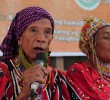Said Felixberto Olalia of NAFLU: �Ang pinakamalaki nitong nagawa ay ang makapagbigay ng halimbawa ng genuine trade union. Hindi kami nagluluku-lokohan. Hindi kami tumatanggap ng under the table deals (lagay). Ang ipinaglalaban namin ay para sa kapakanan ng mga manggagawa. Ang isa pa naming nagawa ay ang aming pagposisyon laban sa pagsasamantala ng mga dayuhan, laluna sa tinatawag na transnasyunal o multinasyunal. Nilalabanan namin ang lahat ng nagiging sanhi ng ano mang makasasama sa mga manggagawa.�(Its biggest legacy is serving as an example of a genuine trade union. We are not fooling the workers. We do not accept under-the-table deals. We are fighting for the interest of the workers. One of the things we were able to do was to take a stand against exploitation by foreigners, particularly the so-called transnational or multinational corporations. We fight all those that will be bad for the workers.)
With NAFLU striving to increase the number of �genuine trade unions,� or militant and anti-imperialist unions, Olalia did not stop pursuing his dream to unite the Philippine trade union movement and expand the scope of their struggles from mere plant-level collective bargaining negotiations to joining street and parliamentary struggles. While keeping an eye on NAFLU�s undertakings (where later he would be helped a great deal by his son, Rolando Olalia, who was then shaping up into another great labor leader himself), Olalia launched himself into repeated efforts to form a broader organization that would unite and solidify labor.
In 1959 Olalia campaigned to unite the trade union movement with the formation of the Katipunan ng Manggagawang Pilipino (Association of Filipino Workers), but it lasted only until 1963. He co-founded the Lapiang Manggagawa (LM, Workers� Party) which later became the Socialist Party of the Philippines (SPP). In 1964, he conceived and finally organized with the assistance of other peasant leaders, the Malayang Samahang Magsasaka (Masaka, Free Association of Peasants), composed of peasants from Bataan, Bulacan, Zambales, Laguna, Batangas, Pampanga, Nueva Ecija, Tarlac, Cavite, Rizal and other provinces. Masaka was considered the most militant and biggest peasant organization until the declaration of Martial Law in 1972.
He was leading a worker-peasant delegation to the People�s Republic of China when Martial Law was imposed in the Philippines. He was said to have thought hard about returning, he was being offered an asylum in China. But Olalia still went back home where at the airport, he was promptly seized and then detained at Camp Crame for about five months.
The struggle to end the Marcos dictatorship
Olalia�s leadership in militant unionism and mass movement ran against each Philippine government�s ideas of economic growth which revolved around selling the country�s natural resources, including its cheap and docile workers. Or in today�s parlance, �competitive.�
As president of NAFLU and with his talents for alliance work, Olalia helped a great deal in the Filipino labor movement�s concerted efforts to resist the clampdown on their human and trade union rights, and in the process to expose and oppose the Marcos dictatorship�s iron rule. Through their concerted mass actions and campaigns, they brought home the message that contrary to the much-promised development, the majority of the Filipino people were increasingly getting hungrier, their livelihoods and wages insufficient to cover even the most basic of their needs.
The strikes and demonstrations they held even when these were banned gave others hope and courage in joining protest actions. The success of the strikes they led, as well as the growing restiveness of labor amidst a worsening economic situation, eventually paved the way for a broader cross-section of Philippine labor movement to meet together to hold a joint May Day rally, despite the ban on rallies.
In the 1980s, Olalia and the labor organizations he led also became popular among people�s organizations abroad, so that the Philippines� Grand Old Man of Labor Movement was frequently invited to speak at conferences abroad. Establishing linkages with labor organizations abroad, Olalia also helped urge these organizations to pressure their governments to withdraw its support from the Marcos dictatorship.
For his life�s work in the progressive people�s movement, Felixberto Olalia paid a high price � in sum he had been arrested and charged with rebellion from September 1951 to 1956; jailed in 1972 (because he cannot bear to not be in the Philippines where the war was being fought); arrested again and charged with conspiracy to rebellion in 1982. He died a prisoner in 1983, at the age of 80.
He died a hero�s death, but it is the courageous and resilient way he had spent his long life in service of the people that deserves to be remembered and emulated. Notwithstanding the awards he received, the countless votes of confidence and support from the masses of workers and even from some organizations of the upper classes, Felixberto Olalia deserves to be recognized as our national hero. He himself explained why, although he probably never meant it that way: �Banal at dakila ang maglingkod sa uring manggagawa.� (It is virtuous and noble to serve the working class.) Bulatlat










